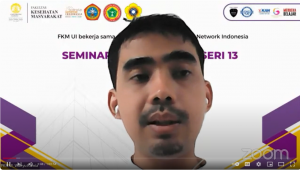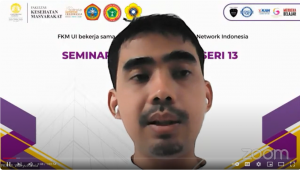
The Faculty of Public Health (FPH) Universitas Indonesia (UI) is collaborating again with SUN Academia & OP Network Indonesia to hold SEMOL (Online Seminar). Presenting two expert speakers in the field of Nutrition, SEMOL FPH UI will be held again in its 13th Series on Friday, June 7, 2024.
“The big hope that we have with holding this routine activity is that there will be more information and an open network of activities for all ladies and gentlemen in solving the problem of nutrition in Indonesia as a shared goal,” said Wahyu Kurnia Yusrin Putra, S.K.M., M.K.M., Lecturer and Secretary of the FPH UI Undergraduate Nutrition Study Program in his speech.
The first discussion was delivered by Sada Rasmada, S.Pt., M.K.M., Lecturer in the Nutrition Study Program, STIK Sint Carolus with the title “Increasing Cadre Capacity in Efforts to Fix Nutrition Problems”. The discussion shows the activities that have been carried out by STIK Sint Carolus for cadres in Johar Baru District, Central Jakarta. “The activity we have carried out is providing education about the contents of my plate and the diversity of food ingredients to cadres in Johar Baru District. In implementing the intervention, there are steps that we take, starting with conducting a survey on nutrition and health problems to carrying out a resume of activities by the cadres as the final step. “The results of the intervention that we got from the Isi Piringku educational activity showed an improvement, both in increasing knowledge and pre-test practice,” explained Sada Rasmada.
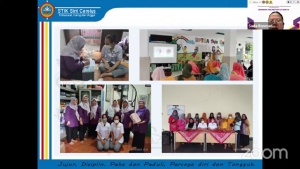
“Educational activities regarding Food Ingredient Diversity provide discussion and understanding of the variety of food ingredients consumed. The intervention steps taken began with the implementation of a survey on nutrition and health problems and ended with monitoring and evaluation activities. “The results of the intervention provided show an increase in understanding of food frequency and the types of food consumed in the morning,” added Sada Rasmada.
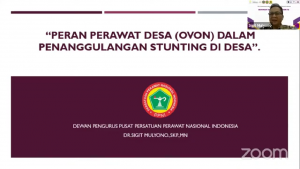
Furthermore, the material “The Role of Village Nurses (OVON) in Handling Stunting in Villages” was delivered by Dr. Sigit Mulyono, S.Kp., M.N., FIK UI Lecturer and Representative of the Indonesian National Nursing Association (PPNI). One Village One Nurse (OVON) is an innovative program implemented in the form of collaboration by PPNI and the Ministry of Home Affairs (Kemendagri) in bridging and overcoming problems in villages. “Stunting begins with the main problems when a mother is pregnant, giving birth, exclusive breastfeeding fails, followed by formula milk that does not support it, MPASI that is lacking in quality and quantity, children who are often sick, and insufficient immunization. “So, handling stunting is not only done by nurses, but requires the role of interprofessional collaboration,” said Dr. Sigit Mulyono. “The existence of OVON is in sync with the 2020-2024 RPJMN, namely providing services or health delivery, preventive and promotive strengthening, and system strengthening,” added Dr. Sigit Mulyono.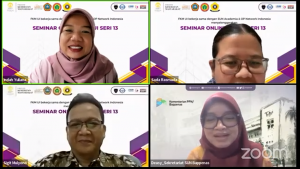
Village nurses are a community of nurses who are present in villages. Village nurses are presented as an effort to solve problems in the village for several reasons. “The existing programs so far have not reached remote communities, the existence of health service facilities still does not meet the health needs of people in villages, health human resources have not fully reached all village communities, the total number of community health centers is 10,017 and only 4,029 community health centers or 40.22 “% who have facilities for 5 types of promotive and preventive efforts,” explained Dr. Sigit regarding the reason the Village Nurse was present.
“This is in accordance with the role that nurses have as community nurses, namely having competency in health services based on community service; application of the concept of Community Health Nursing (CHN) nurses in solving health problems based on families/supported areas, especially at the village or sub-district level; have the ability to multitask in all sectors of health services with reliable and proven competencies; participate in efforts to overcome strategic issues; as well as as a planner, implementer and evaluator of public health programs,” he explained.
The development of OVON in Indonesia has covered 9 provinces in Indonesia, namely East Java, Southeast Sulawesi, South Sulawesi, West Java, Lampung, Banten, West Nusa Tenggara (NTB), North Maluku and Bali. (ITM)

